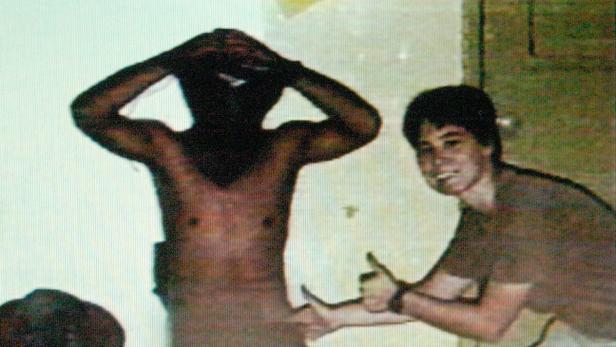Millionen für Abu-Ghraib-Gefolterte
Die gefolterten Ex-Häftlinge erhalten nach einem Rechtsstreit fünf Millionen Dollar von einer US-Sicherheitsfirma.
Wegen des Folterskandals im irakischen Gefängnis Abu Ghraib hat eine US-Sicherheitsfirma ehemaligen Häftlingen mehr als fünf Millionen Dollar (ca. 3,8 Millionen Euro) gezahlt. Damit wurde im vergangenen Oktober ein Rechtsstreit beigelegt, wie am Dienstag bekannt wurde.
Die Kläger, 72 frühere Abu-Ghraib-Gefangene, hatten der Firma L-3 Services Inc. (jetzt Engility Holdings) und anderen Unternehmen vorgeworfen, an Misshandlungen von Häftlingen durch US-Soldaten beteiligt gewesen, sie gebilligt oder stillschweigend geduldet zu haben.

© APA/MEDIA HANDOUT
epa01982988 (FILE) An image first seen on the CBS television program Sixty Minutes II aired on 28 April 2004 and altered due to the contentof showing Iraqi prisoners in Abu Ghraib prison near Bhagdad, Iraq allegedly seated on top of other prisioners while nude and their heads covered with hoods as a woman identified as US Army Pfc. Lynndie England points to the prisoners' genitals. England has plead guilty to charges of conspiracy, dereliction of duty, maltreatment of subordinates and indecent acts at Abu Ghraib prison in Iraq during her court-martial at Ft. Hood, Texas, USA in May 2005. US Army Spc. Charles Graner, England's former lover, the reputed ringleader of a band of rogue guards at the Abu Ghraib prison, was condemned by a US military tribunal in Fort Hood, Texas, USA for the abuse of Iraqi detainees on 15 January 2005. He was sentenced to 10 years in prison. January 15, 2010 marks the fifth anniversary of Graner's condemnation by a military tribunal for the tortures committed in the prison of Abu Ghraib. EPA/MEDIA HANDOUT EDITORIAL USE ONLY/NO SALES
Der Folterskandal in Abu Ghraib war 2004 durch die Veröffentlichung von Fotos (siehe links) publik geworden, die weltweit Empörung auslösten. Elf US-Soldaten wurden zu Haftstrafen von bis zu zehn Jahren verurteilt. Ehemalige Insassen hatten die Auftragnehmer der US-Armee, L-3 Services, CACI International und CACI Premier Technology, verklagt.
Kommentare